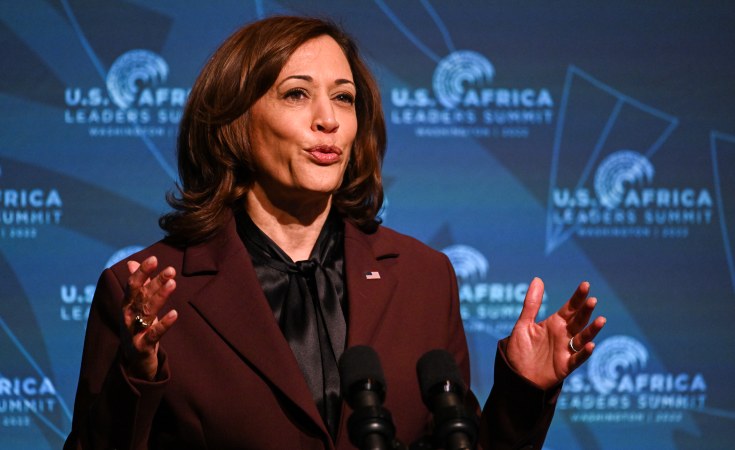The US-Africa Leaders Summit in Washington this week is a chance for the United States and countries in Africa to move closer to "win-win" partnerships, analysts say.
Economic and political analysts in Africa say the continent's leaders must push for fair trade deals and better economic partnerships with the United States when they gather in Washington this week.
About 50 high-level African delegations are expected at the US-Africa Leaders Summit convened by the Biden administration.
"It should not be about just a matter of attending the summit. We should know what we want. We need to tell them that yes, we are ready to do business with them," said Daniel Amateye Anim, an economist based in Ghana's capital, Accra.
Negotiating fair deals to improve economies in Africa should be a priority, Anim told DW.
Political analyst Martin Andati told DW from Nairobi that African leaders should not attend the summit as "beggars."
"They should go in for a form of partnership which creates a win-win situation," he said.
The African Growth and Opportunity Act (AGOA) has been at the core of US economic policy and commercial engagement with sub-Saharan Africa since 2000. It provides eligible countries in the region with duty-free access to US markets for over 1,800 products.
Anim said that Africa had not explored the potential of the AGOA enough. The program is due to run until 2025 but there are indications that the Biden administration might want to extend it beyond then.
US trails China in trade with Africa
But Andati said that the AGOA had been overtaken by developments in Africa, including the African Continental Free Trade Area (AfCFTA), the largest of its kind in the world, which came into effect on January 1, 2021. In addition, China's engagement and influence in Africa have grown and overtaken that of the US.
"AGOA is no more effective like it was under President [Bill] Clinton. It had a big impact then but now most things, which are being exported, are not even produced on the continent. The raw materials are coming from China," Andati said.
China's foreign direct investment in Africa is nearly double that of the US. The Asian giant is also the largest lender around the continent.
According to the US Congressional Research Service, Chinese deals with 632 businesses in Africa totaled $735 billion (€698 billion) in 2020. The previous year, 800 trade and investment deals across 45 countries were valued at $50 billion. CRS data also shows the US invested $22 billion in 80 companies in Africa over the same period.
The US has repeatedly warned Africa over its engagement with China and Russia. The matter is expected to come up at the summit this week.
"The Chinese have overrun the Americans and now the Western world, led by the US, is trying to find a way of getting back into Africa to be able have its presence felt," Andati said.
At a media briefing last week, US Deputy Assistant Secretary of Defense for African Affairs Chidi Blyden said that the US would have to review its position on Africa and the kind of partnerships it can establish.
"We have been told by our African partners -- and we completely agree -- that they don't want to have to choose between working with the United States, other international partners and China. And we respect that," he said.
"I'm open to understanding more about what our African partners need, and we'll learn a little bit of that from the Africa Leaders Summit."
Blyden added that US officials meeting with African leaders would be "listening and understanding where we can fill in the gaps or where we can work and complement other partners that they're working with, to include China."
Daniel Amateye Anim suggested that Africa could exploit the US-China-Russia divide. "In fact, they [US] are not too comfortable with China and with Russia's presence on the continent so we should use it as a tool to attract more funding."
Security, COVID recovery and food
Andati said that the issue of security, especially in the regions of the Great Lakes, Horn of Africa and Sahel, should be discussed at the summit.
"The Americans are very keen, especially in the Horn of Africa where they have a certain interest. The instability in Somalia has affected the way the Americans do some things," he told DW.
Blyden said that the US did not want to focus entirely on a military approach to ending security crises on the continent. "We're trying to learn from past efforts in the Sahel and ensure that we have engagement, partnership, and collaboration with our African partners to do this."
The first US-Africa Leaders Summit was held in 2014. Energy, trade, financial services, climate change, food security and healthcare were some of the issues discussed.
Similar matters are on the summit schedule this year, with an even greater emphasis on bilateral trade and investment initiatives.
It noted that talks would center on initiatives to boost Africa's recovery after the pandemic, bolster food security and promote investment in infrastructure, heal and renewable energy projects.
Coup regimes excluded
Certain countries have not been invited to the summit. The White House named them as Burkina Faso, Mali, Guinea and Sudan and said they were excluded because the AU had suspended them over recent coups.
Eritrea has also been excluded since it has no diplomatic relations with the US.
The delegations due in Washington on Tuesday include the heads of state of key countries such as Nigeria, Uganda, Kenya, and Angola. The chairman of the African Union's executive body, Moussa Faki Mahamat, will also attend.
Alexandria WIlliams in Washington contributed to this article.
Edited by: Benita van Eyssen


